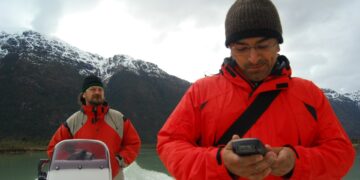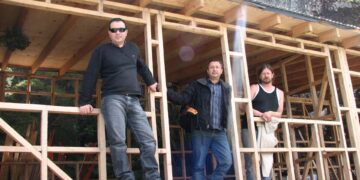History
Over the past two decades, oceanographic research in Chile has expanded significantly, with a strong contribution from the COPAS Center (Center for Oceanographic Research in the South-Eastern Pacific) at the University of Concepción. The project began as a center for fundamental marine science and later supported as a scientific center with a strong transfer component to society by ANID, first as COPAS Sur-Austral and, since 2021 as COPAS Coastal.
Throughout 17 years of activity, COPAS has pioneered the collection and dissemination of high-quality oceanographic data in Patagonia, established long-term observation systems along the Chilean coast, and consolidated a research and outreach hub in Caleta Tortel, one of the most remote areas of Aysén. Now in its third funding cycle, COPAS Coastal is extending its scope beyond Patagonia to address the complexity of Chile’s entire coastal ocean, while maintaining its mission of scientific excellence, knowledge transfer, and public engagement.
Mission
Vision

Atmospheric and oceanic forcings
Principal Investigator: Diego Narváez
Evolving coastal ecosystem
Principal Investigator: Fabián Tapia

Coastal biogeochemistry
Principal Investigator: Marcelo Gutiérrez
Addresses the mechanisms that transfer land-based and human-based organic products to the ocean nutrient cycle and the effect of changing conditions on the microbial cycle of organic matter and greenhouse gases in the ocean.

Fisheries sustainability and conservation
Principal Investigator: Susannah Buchan
It will promote ecosystem-based management of marine living resources and support conservation strategies that ensure coastal ecosystems adapt to likely environmental changes.
MOTOR – COPAS COASTAL
MOTOR is a Technology Transfer Unit within COPAS Coastal that serves as a bridge between public and private organizations and science. It focusses on all aspects of coastal and operational oceanography, ocean literacy and natural resource management. It facilitates the inclusion of scientific knowledge in the decision-making process of in Chile.
Main services

Modeling
- Platform for modeling coastal circulation, atmospheric dynamics, ecosystems, populations, and individuals.
- Oceanographic modeling applied to coastal hydrodynamics for forecasting winds, waves, and currents (in development).
Technology development
- Design and development of oceanographic equipment and instruments for applications in aquaculture, fisheries, coastal dynamics, and port operations.
- Oceanographic buoy systems with integrated sensors (in development).
- Ocean acoustic measurements.


Outreach and education
- SOS Ocean Program for teachers, science communicators, and tour operators interested in ocean literacy and climate change.
- Development of Environmental and Tourism Interpretation Centers.
- Educational and outreach materials to promote Ocean Literacy.
Public service and natural resources
- Public policy proposals for Chile and Latin America on fisheries, aquaculture, climate change adaptation, management areas, benthic resources, coastal marine spaces, and marine spatial planning.
- Technical consulting in fisheries, human impacts on the ocean, ecosystem-based approaches, and climate change adaptation.
- Diploma Program on Climate Change Adaptation in Fisheries and Aquaculture (E-Learning).
- Laboratory for detection and analysis of biotoxins in shellfish and microalgae samples.
- Culture collection and capabilities for conducting molecular assays and bioprocesses using toxic microalgae.











